The Most Effective Medical Alert Systems for Dementia Patients IN 2024
Explore the specifics of the best medical alert systems, their features, pros and cons, and their suitability for dementia patients.
Brio House is an independent review site. We may earn money when you click links inside our site.
Navigating life’s journey with a loved one diagnosed with dementia can be challenging. A crucial ally in this journey is a reliable medical alert system. These systems are vital lifelines designed to ensure safety and provide immediate access to help in emergencies. They are designed to offer quick assistance in case of accidents, falls, and health crises, making them indispensable tools for those caring for people with dementia.
Dementia patients require specialized care, and thus, a generalized medical alert system might not suffice.
The market is awash with various medical alert systems, each with its own array of features, services, and pricing. From Bay Alarm Medical, renowned for its comprehensive coverage and robust system, to Medical Guardian, which boasts some of the most innovative features, the options can be overwhelming. Not to mention the systems provided by Medical Care Alert, and Aloe Care Health, which are notable for their exceptional service.
Making an informed decision requires a deeper understanding of these best medical alert systems and their offerings.
Explore the specifics of the best medical alert systems, their features, pros and cons, and their suitability for dementia patients. The goal is to equip you with all the information necessary to make an informed decision that ensures the safety and well-being of your loved ones.
Understanding The Needs of People with Dementia
When selecting a medical alert system for someone with dementia, understanding their unique needs is paramount.
Dementia, which includes Alzheimer’s disease and other neurodegenerative conditions, affects cognitive functions such as memory, attention, language, and problem-solving. It can lead to disorientation, forgetfulness, and challenges in recognizing familiar people and places. As such, the needs of people with dementia differ from those without these conditions.
Safety and Ease of Use
Safety is the foremost consideration when selecting a medical alert system for a dementia patient. Look for features like automatic fall detection, GPS tracking, and geofencing. These features can automatically alert emergency services or caregivers in case of a fall, track the patient’s location if they wander, and even set up a virtual boundary that triggers an alarm if crossed.
Equally important is the ease of use. The system should be simple and straightforward, with large, clearly marked buttons or voice-activated controls. Complicated systems can confuse dementia patients and might not serve their purpose in emergencies.
24/7 Monitoring and Support
Given the unpredictable nature of dementia, round-the-clock monitoring is essential. Look for a system backed by a monitoring center that operates 24/7 and can dispatch emergency services when needed. Also, two-way communication allows the patient to interact directly with the on-the-go system or support center, which can be reassuring during a crisis.
Caregiver Involvement
A medical alert system that includes caregiver tracking or allows for caregiver alerts can be highly beneficial. Such systems can send notifications to designated family members or caregivers if the alert button is pressed or if the system detects a fall. This enables family members or caregivers to be actively involved in monitoring the patient’s well-being.
Medication Reminders
Dementia often affects memory, making it hard for patients to remember to take their medication. A system that includes medication reminders can be a lifesaver. It can alert the patient when it’s time to take their medication, reducing the risk of missed doses.
Comfort and Aesthetics
Finally, the comfort and aesthetics of the device matter, too. It should be comfortable to wear and not feel intrusive. Some dementia patients might resist wearing something that looks too much like a medical device, so consider systems with a more discreet or aesthetically pleasing design.
Always consider the individual’s specific symptoms, as the effects of dementia can vary widely from person to person.
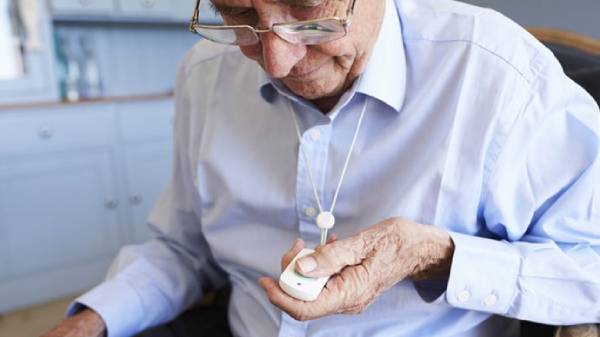
Factors to Consider When Choosing a Medical Alert System for Dementia Patients
Choosing the right medical alert system for dementia patients entails understanding and considering several essential factors. Let’s delve into them.
Automatic Fall Detection
As dementia progresses, it increases the risk of falls due to issues like disorientation and loss of balance. This makes fall detection a crucial feature in a medical alert system for dementia patients. Automatic fall detection can alert the monitoring center even if the patient cannot push the emergency button, ensuring help is dispatched promptly.
While standard fall detection requires user activation, automatic fall detection works independently, responding to sudden movement changes. Understanding this difference is vital as it could significantly affect response time during a crisis.
GPS Tracking and Advanced Location Detection
Wandering is common in dementia patients, making a compact device with GPS tracking indispensable. A medical alert system with GPS location tracking can quickly pinpoint the user’s location, ensuring rapid and accurate assistance.
Location data from a mobile system plays a crucial role in dementia care by allowing caregivers and emergency contacts or responders to locate patients swiftly, especially when confused or lost. Systems with advanced location detection provide more precise data, further enhancing patient safety.
Mobile Systems and On-the-go Devices
With their portability and user-friendly design, mobile devices can significantly enhance patient safety. They ensure that patients remain connected to the alert system irrespective of their location within the house or outside.
On-the-go systems offer similar benefits, providing protection at home and wherever the patient goes. These systems can be especially beneficial for patients in the early stages of dementia who maintain an active lifestyle.
Battery Life of the System
An alert system is only as good as its power source. A long battery life ensures continuous monitoring, which is crucial for dementia patients who might forget to charge the device.
Different systems offer varying battery life, from a few hours to several days. Comparing these aspects can help you choose a system that best fits your loved one’s lifestyle and your peace of mind.
Cellular System Versus Landline System
Cellular systems offer more flexibility and wider coverage, making them ideal for mobile or on-the-go devices. However, they may face signal issues in some locations. On the other hand, landline systems provide stable and reliable connections but limit mobility.
The choice between cellular and landline systems largely depends on the patient’s lifestyle. A landline system might suffice for homebound patients, but a cellular system could be a better fit for more active patients.
Understanding these factors is essential in choosing a system that not only caters to the needs of dementia patients but also provides caregivers with the assurance of safety and prompt assistance for their loved ones.

Can a medical alert system prevent a person with dementia from wandering?
Medical alert systems with GPS tracking can’t prevent wandering, but they can alert caregivers if a person leaves a designated area or help locate someone if they wander.
What are the Best Medical Alert System For Dementia Patients in 2024?
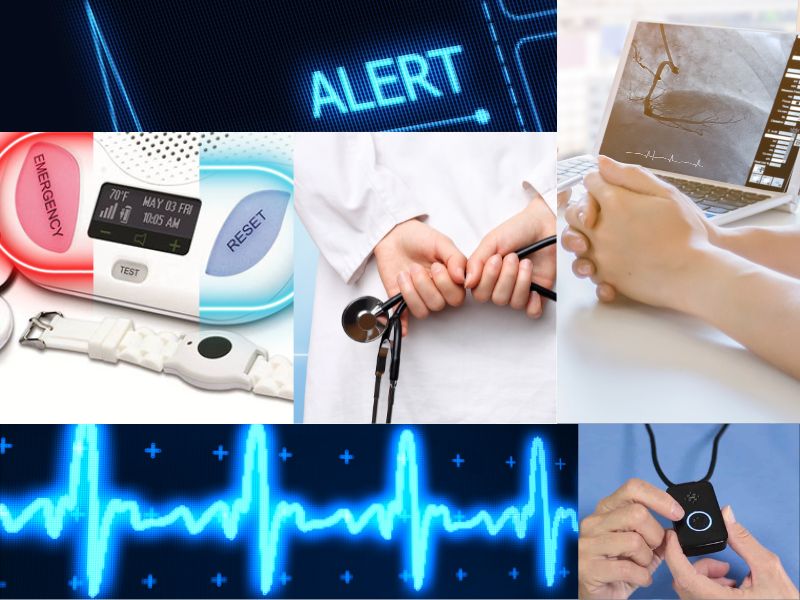
Reviews: The Best Medical Alert System For Dementia Patients in 2024
Choosing a medical alert system company is not a decision to be taken lightly. The company behind the system plays a significant role in determining its reliability, features, and overall effectiveness. Here’s a deep dive into some top medical alert system companies.
1. Bay Alarm Medical
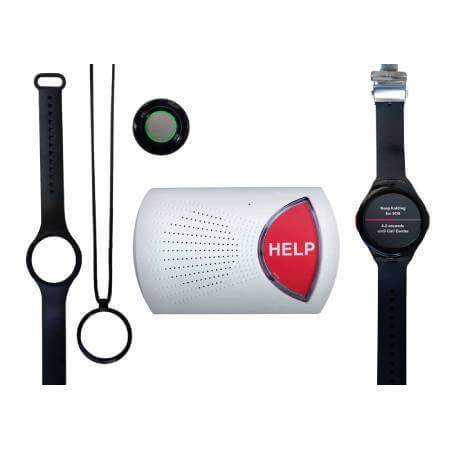
Bay Alarm Medical
Our Rating:

5.0
Bay Alarm Medical is one of the leading providers of medical alerts, offering both in-home and on-the-go solutions. Their offerings include landline and cellular systems, with optional fall detection and GPS tracking.
Features like caregiver tracking, two-way communication, and a robust mobile GPS system are unique to Bay Alarm. Their devices are known for their long battery life and water-resistant properties. Bay Alarm also offers a duo system, where users can bundle the in-home system with cellular service on a mobile device for comprehensive coverage.
PROS
CONS
2. Medical Guardian
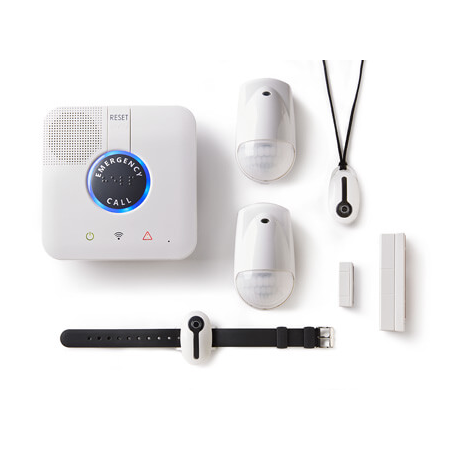
Medical Guardian
Our Rating:

4.7
Medical Guardian systems stand out for their advanced features and user-friendly design. They offer a wide range of systems, including classic home-based units, mobile units, and wearable devices, all with fall detection options.
According to customer reviews and expert evaluations, Medical Guardian is recognized for its excellent customer service and state-of-the-art equipment. Their systems offer location tracking, two-way communication, and a simple online portal for family members to check on their loved one’s status.
PROS
CONS
3. Medical Care Alert
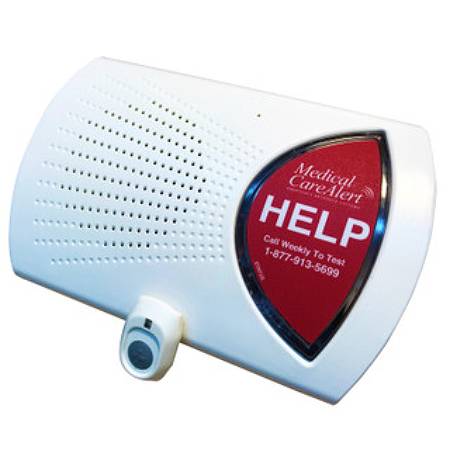
Medical Care Alert
Our Rating:

4.6
Medical Care Alert offers a variety of call alert systems for seniors, from basic service for homebound seniors to more advanced options with cellular connections and on-the-go capabilities. They also provide a system that works well for Alzheimer’s or dementia patients, featuring a GPS location tracking service and fall detection.
Evaluations of Medical Care Alert highlight their excellent customer service and user experience. They provide 24/7 monitoring services from a certified center, and their systems are easy to install and use, making them a favorite among seniors and caregivers.
PROS
CONS
4. Aloe Care Health
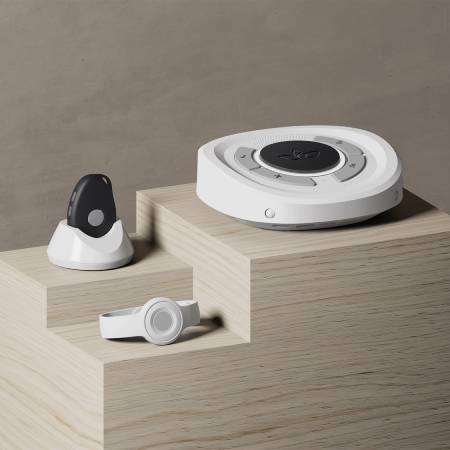
Aloe Care Health
Our Rating:

4.7
Aloe Care Health systems offer a holistic approach to elder care. Their smart hub provides voice-activated help and motion sensors, and their mobile companion offers fall detection, two-way talk, and even location history data for use on the go.
In real-life scenarios, Aloe Care’s systems have proven reliable and efficient. They offer a comprehensive care circle, including family members, caregivers, and medical professionals. Their systems also come with a mobile app for caregivers, which provides updates and allows for direct communication with the user.
PROS
CONS
By exploring these top companies and their offerings, you can ensure you choose the most suitable medical alert systems for seniors with dementia.
Special Features to Look For
Choosing the best medical alert system for a dementia patient involves considering numerous features. While standard options like emergency response and fall detection are important, other specialized features can significantly enhance safety and ease of use. Let’s take a closer look.
Medication Reminders and Management
Medication management becomes critical in dementia care as forgetting or mixing medications is common. Features like reminders and management tools can help patients take their medication correctly and on time. It eases the burden on caregivers and ensures the right dosage is taken at the right time.
Different systems offer varying levels of medication management. While some provide simple reminders, others have advanced management systems that allow caregivers to monitor medication intake. Evaluating each system’s capabilities in this area can be critical in making the right choice.
Caregiver Tracking Feature
A caregiver tracking feature offers added reassurance to both caregivers and family members. It allows them to monitor the patient’s movements, ensuring they are safe and have not wandered off. It also enables them to respond quickly if there’s an emergency.
Different alert systems provide different levels of caregiver tracking. Some offer real-time tracking, while others provide alerts only in emergency situations. A thorough comparison of these capabilities across different systems can help choose the most suitable one.
Voice-Activated Wall Buttons
These buttons are designed to be easy to use, especially for dementia patients who may struggle with small buttons or complex gadgets. With a simple voice command, help can be summoned on the go option, making it user-friendly and effective.
The effectiveness of voice-activated buttons largely depends on their responsiveness and accuracy in recognizing commands. Evaluating these factors across various systems is essential to ensure the system can effectively respond in an emergency.
Water-Resistant Devices
Water resistance in medical alert devices is a crucial feature. Many accidents occur in wet areas like the bathroom. A water-resistant device ensures the system remains functional even in such environments, providing uninterrupted safety.
Various companies offer water-resistant devices, but their level of resistance may vary. Some devices are splash-resistant, while others can be fully submerged in water. Comparing these offerings can help identify the most robust and reliable option for your loved one.
When combined with the core functions of a medical alert system, these special features can offer enhanced safety and peace of mind for dementia patients and their caregivers. Remember to evaluate each feature in the context of the specific needs of your loved one when making your selection.
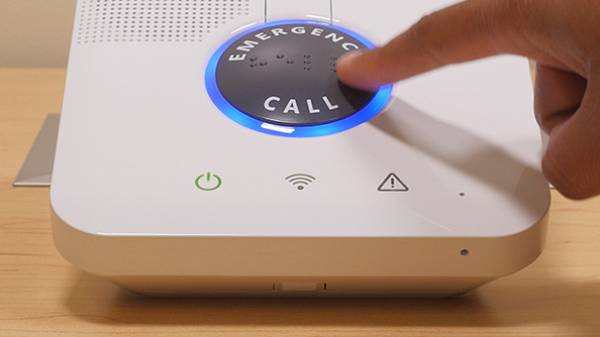
Cost Considerations
While features and functionality are crucial in a medical alert system, understanding the associated costs is equally important. Demystify the financial aspects, helping you make an informed decision without unexpected expenses.
Understanding Monthly Fees and Equipment Fees
Medical alert systems typically come with two types of costs: monthly fees and equipment fees. The monthly fee covers the monitoring service, and the equipment fee is the upfront cost for the device itself. These costs can vary widely depending on the system, with more advanced systems generally carrying higher costs.
When weighing the benefits versus the cost of each system, it’s important to consider the patient’s needs. A lower-cost system might seem appealing but may not be the best value if it doesn’t provide the necessary features. Similarly, a more expensive system with many advanced features may not be needed for all patients.
Bundled System Options and Activation Fees
Bundled systems often provide value for money by offering multiple devices or features in a home unit or at a reduced rate. They can include in-home and mobile systems, extra wearable devices, or additional services like medication reminders and caregiver tracking.
Activation fees are one-time charges for setting up the system. Not all companies charge activation fees, and in some cases, these fees can be waived during promotional periods or negotiated out of the contract. It’s essential to ask about potential activation fees upfront to avoid surprises later on.
Cost should not be the sole deciding factor, but it’s a significant consideration when choosing a medical alert system. Balancing the cost with the needed features and services will help ensure you get a system that provides the best care for your loved one without breaking the bank.
Importance of Two-way Communication and Alerts
Two-way communication and swift alerting mechanisms are pivotal in effective medical alert systems, especially for dementia patients. These features can mean the difference between a swift emergency response and potential delays that could risk the patient’s health.
Examining How Medical Professionals Receive Alerts
The efficiency of a medical alert system relies significantly on how promptly medical professionals receive alerts. A swift alert can lead to rapid emergency services, reducing the risk of severe outcomes following an accident or health issue. A system that provides immediate medical alerts also ensures that help is always just a button press away.
A robust cellular network or landline system is critical to ensure uninterrupted communication. Cellular networks are particularly crucial for mobile systems, facilitating communication even when the patient is away from home. When using a cellular connection and choosing a system, consider the reliability of the cellular network or landline system used to transmit alerts and messages.
The Significance of Two-Way Communication
Two-way communication is a feature that allows the patient and the monitoring center or caregiver to speak directly to each other. For dementia patients, this can be particularly comforting as it gives them the reassurance that help is on the way. It’s also beneficial for family members and caregivers, as they can speak directly to the patient, calming them down or gathering more information about the situation.
The best medical alert systems offer crystal-clear two-way communication, often via a base unit or wearable device. Some advanced systems may also have a feature for the monitoring center to listen in during emergencies to assess the situation better. As you review different medical alert systems, pay close attention to the quality and reliability of their two-way communication offerings.
Choosing a medical alert system with efficient alert mechanisms and reliable two-way communication ensures that help is always within reach for your loved one, promoting their safety and peace of mind.
Frequently Asked Questions:
Are medical alert systems easy to use for someone with dementia?
Many medical alert systems are designed with simplicity in mind, making them suitable for individuals with dementia. They typically have large, easy-to-press buttons or even voice-activated controls. However, the ease of use can vary between systems, so choosing one that aligns with the user’s comfort level and cognitive abilities is important.
Can a medical alert system prevent a person with dementia from wandering?
Medical alert systems with GPS tracking can’t prevent wandering, but they can alert caregivers if a person leaves a designated area or help locate someone if they wander.
Are there medical alert systems specifically designed for individuals with dementia?
While there may not be systems exclusively for dementia patients, many medical alert systems offer especially beneficial features for people with dementia, such as GPS location tracking, automatic fall detection, medication reminders, and easy-to-use devices.
Do all medical alert systems require a monthly fee?
Most medical alert systems do require a monthly fee. This fee typically covers the use of the equipment and the 24/7 monitoring service. However, terms can vary among providers, so it’s important to thoroughly understand the cost structure before deciding.
Can a medical alert system replace a caregiver for a person with dementia?
No, a medical alert system cannot replace a caregiver. While it can provide an extra layer of safety and quicker response in emergencies, people with dementia often require hands-on care and assistance that a medical alert system can’t provide. However, it can be a valuable tool for assisting caregivers in providing care.
The Bottomline:
Choosing the best medical alert system ultimately comes down to the specific needs of the dementia patient. Keep in mind their lifestyle, mobility, and the progression of their dementia when making this decision. Look for a system that balances essential features, advanced functionalities, cost-effectiveness, and reliable customer support.
Remember, the primary goal is to provide a safe and supportive environment for your loved one, allowing them to maintain their independence as long as possible while ensuring that help is readily available.

